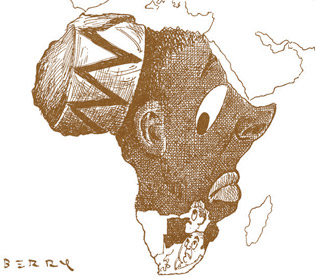Many from One or One from Many?
 According to some purists of Sinhalese language, ‘all’ languages of
the world are derived from our very own Sinhalese. They somehow manage
to give etymological evidence of those derivations, which sometimes
makes you laugh with your heads off. According to some purists of Sinhalese language, ‘all’ languages of
the world are derived from our very own Sinhalese. They somehow manage
to give etymological evidence of those derivations, which sometimes
makes you laugh with your heads off.
According to them word England (Engalanthaya in Sinhalese) is made
out of Sinhalese word ‘Hingala+anthaya’ which means the border of the
land of Sinhalese. While they are providing some interesting
etymological evidences, they stress how far the land of Sinhalese was
spread out.
Do you know word Africa is originally a Sinhalese word? As Sinhalese
purists say, Africa was once been inhabited by us. One day, they have
found out that an army of Negros attacking them to invade the land and
Sinhalese have ran for life screaming ‘Aapiri kaawa aapiri kaawa’(
exchange first two syllables of the two words and you get the Sinhalese
words for Negros have come to attack).
Interestingly intelligent Sinhalese have screamed it differently to
make sure that evil Negros would not understand what they say. By the
way, Negros named the land Aprikaawa or Africa, by the first words they
heard from previous inhabitants. In many linguistic cultures there exist
movements that have as their goal linguistic purism.
 This has been defined in a number of different ways, but often
involves religious or quasi-religious fundamentalism and a return to
linguistic authenticity; it often takes the form of removing from the
language elements (usually lexical) that appear to be foreign, or
corrupt, or lacking in true authenticity in the linguistic culture in
question. This has been defined in a number of different ways, but often
involves religious or quasi-religious fundamentalism and a return to
linguistic authenticity; it often takes the form of removing from the
language elements (usually lexical) that appear to be foreign, or
corrupt, or lacking in true authenticity in the linguistic culture in
question.
Most native speakers of English do not stop to consider the extent of
foreign influence on their language, but it is considerable. Only about
25% of English vocabulary is actually native. The remainder comes from
French (thanks largely to the Norman Conquest), Latin and Greek (mostly
from the Renaissance), and other languages (via colonialism). The word
hybrid commonly refers to animals and plants of mixed lineage, and more
recently to vehicles with two or more power sources. In linguistic
morphology it refers to a word formed by combining elements that
originated in two or more languages. The process is called
hybridization.
Many new words arise through compounding and affixation, and a lot of
roots and affixes in English derive from Latin or Greek - sometimes
indirectly, such as through French. There is a tendency for like to join
with like, but because affixes from other languages are so
well-established in English, and their origins are not widely known,
etymological affinity is not routinely observed when words are formed.
English has always added foreign bits to native bits, and both to other
foreign bits.
A familiar example is television, which (via French) yokes Greek
tele- ‘far’ to Latin visio ‘seeing’. Neuroscience joins Greek neuro-
‘nerve’ to science, from Latin scientia ‘knowledge’.
Other hybrids include automobile, hypercorrection, lovable,
merriment,monolingual, sociology, and talkative.
Purists used to complain about hybrids as if it were somehow unsavory
to fuse morphemes from different languages. Maybe this attitude owed
something to a fastidious temperament and a bias for classical learning.
A linguist cannot blame on hybridity of language as he/she observed a
historical pattern in every hybrid word. Taking example of my own
basket, I could not be disappointed to see my language mixed with
Portuguese, Dutch or Malay. Wherever language contact happens, you
should expect hybridity. Anyway it does not mean a language is ‘dirty’
if some contacts occur. More it is contacted it might be more evolved.
What Sinhala purists wanted to stress is that ours is THE one and
others got theirs from us. My Sinhalese mind appreciates their
creativity and strong will for promotion, but linguist within me wakes
me up from my sweet dream.
|



